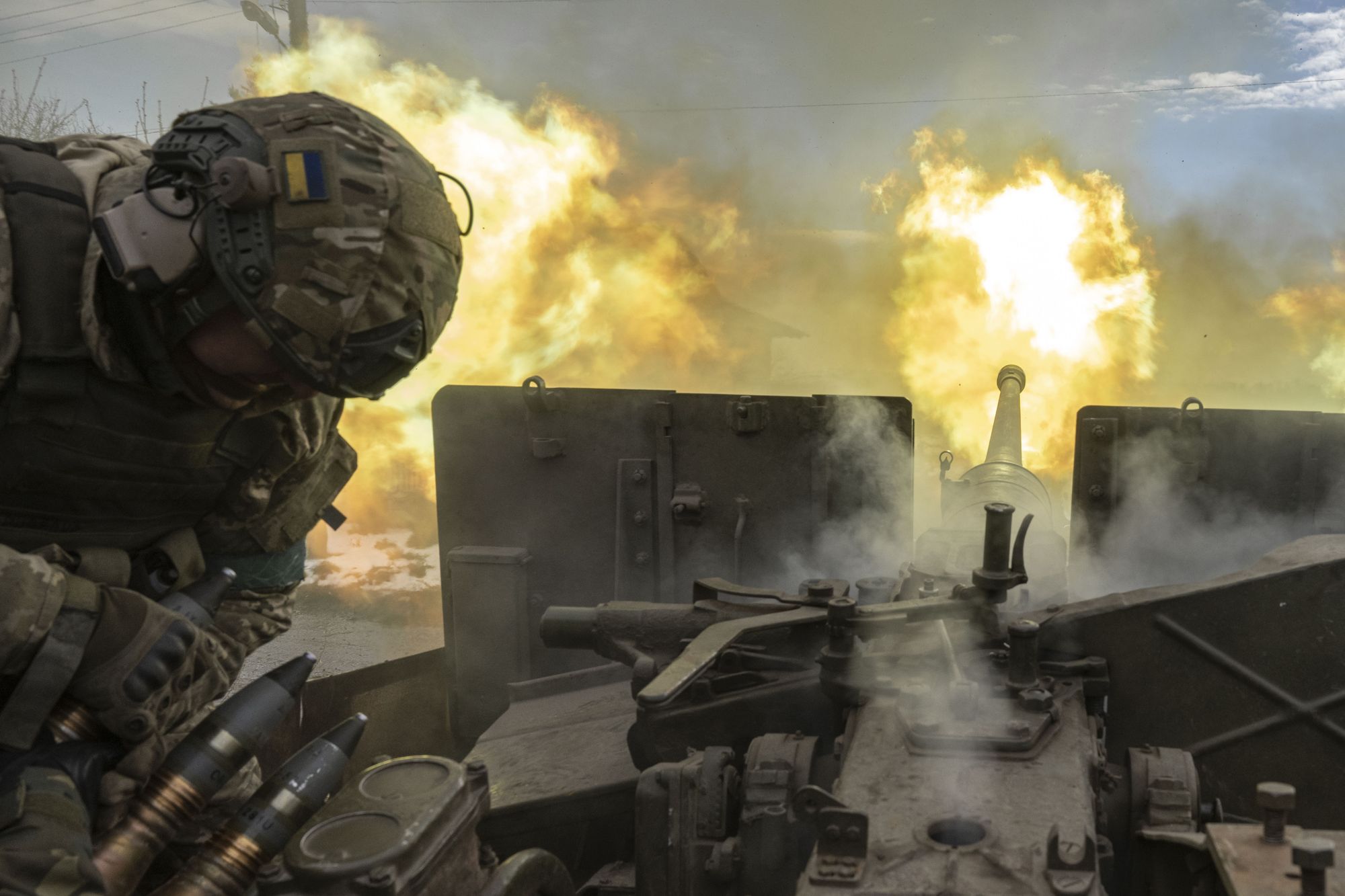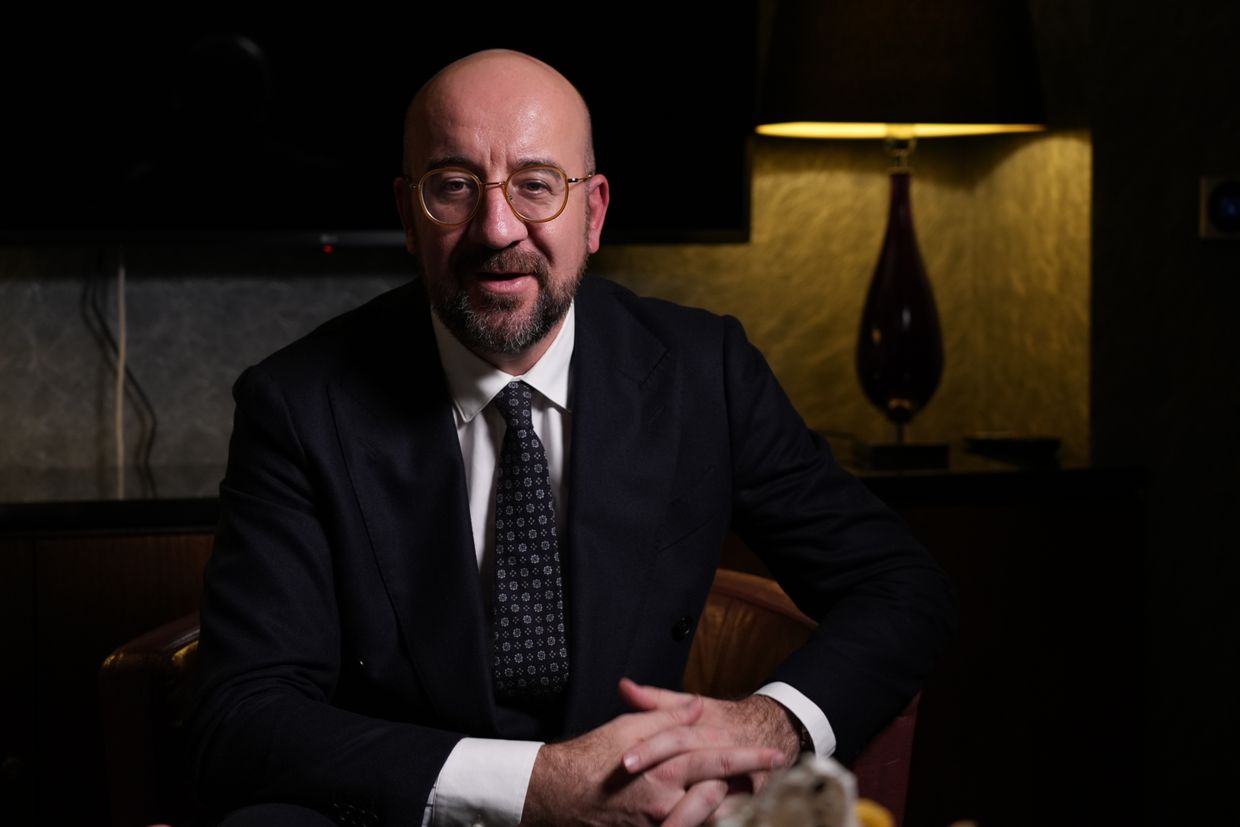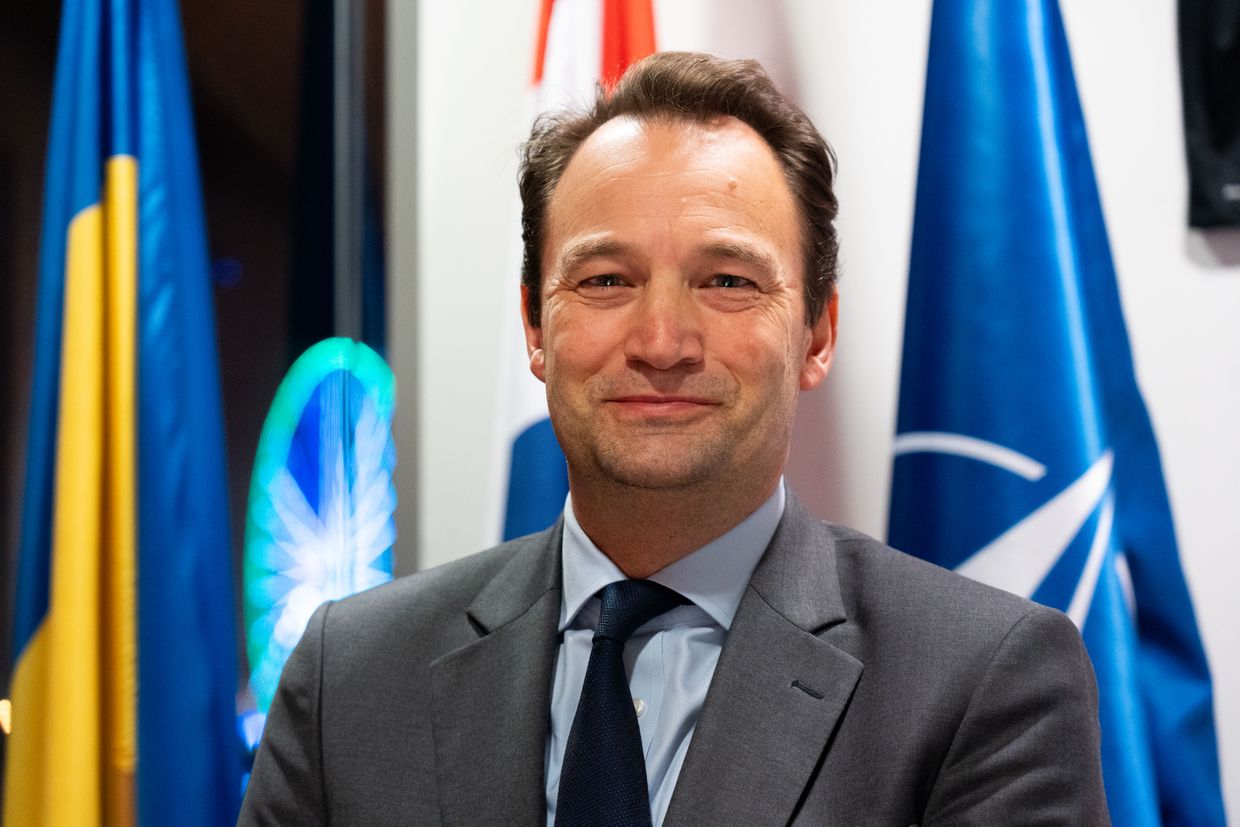Ukraine’s Foreign Minister Kuleba: 'Europe doesn't know how to fight wars'

Sitting down with the Kyiv Independent for an interview in Kyiv, Ukraine's top diplomat is sharply dressed and in a good mood.
Foreign Minister Dmytro Kuleba is among the last Ukrainian top officials who still prefers a suit to a military-style garb. He's happy with the work his ministry has done, and makes all the roadblocks ahead sound like a mere inconvenience.
In 2023, Ukraine received a variety of new Western weapons, including long-range missiles, tanks, air defense and secured the provision of the much-desired F-16 fighter jets. In December, the European Council decided to open accession negotiations with Ukraine in a historic vote.

Yet, a number of obstacles are still there – and some are set to get worse.
Hungary is successfully blocking a $54-billion aid package to Ukraine, now postponed until February. Europe has been unable to produce the much-anticipated 1 million rounds of ammunition, while the U.S. Congress is delaying the vote on Ukraine aid.
Another diplomatic challenge is inside Russian missiles: They still use Western-made chips, a problem that seems hard to solve.
"Russia built some very sophisticated supply chains with the involvement of their intelligence operatives to ensure deliveries of spare parts," Kuleba told the Kyiv Independent in an exclusive interview on Dec. 19.
When talking about the stalled aid from the EU and U.S., the minister is confident that Ukraine will receive it, but the timeframe is still up in the air. When talking about the effectiveness of sanctions and the efforts by the West to hamper Russia's military industry, Kuleba is less confident, but overall optimistic.
When talking about Europe's ability to produce arms for Ukraine and for itself, the minister is much more critical.
"Europe doesn't know how to fight wars. The production of weapons is not the most popular area of business," Kuleba says.
"Unfortunately, our friends spent too much time deliberating on how and when to ramp up their production of weapons and ammunition," he adds.
Shells, F-16s, and 'an honest conversation'
Ukraine's foreign policy is led by President Volodymyr Zelensky and his office, and Foreign Minister Kuleba, backed by the power of his foreign service.
While Zelensky serves as the face and voice of Ukraine’s resistance to Russia’s war, the ministry focuses on the day-to-day preparation and execution of the country's foreign policy goals.
Since the start of Russia's full-scale invasion, the top priority is to make sure Ukraine has the means to defend itself.
"In 2022-2023, we received all types of weapons that were unavailable (to us), including long-range missiles," Kuleba says. "F-16s are on the way. The training (of pilots) is going well."
The Foreign Ministry has been heavily involved in the efforts to bring the jets to Ukraine, pushing both for political decisions to pass the jets and to speed up the training by providing English-language courses to Ukrainian pilots "because you cannot get appropriate training” without sufficient English.
The provision of a wide range of Western arms, from Patriot air defense systems, HIMARS artillery systems, and ATACMS long-range missiles to Abrams tanks and now F-16 jets, has substantially boosted Ukraine’s ability to fight. At the start of the full-scale war, Ukraine was defending its capital with Soviet-made weapons and some Western-provided Javelin anti-tank systems.
Yet, it's unknown whether the West will be able to keep up the pace of providing Ukraine with modern weapons and ammunition to fight a costly war with no end in sight.
"I'm more concerned with the pace of development of defense industries than with the arrival of new types of weapons," Kuleba says.
Russia is currently dedicating around 35% of its budget to the war effort, and actively sourcing military resources from allied states, Belarus, Iran and North Korea. They have provided the Kremlin with cheap but deadly drones and over a million shells.

According to the minister, Russia was able to successfully transform into a war economy.
"The defense industry in Russia is government-owned. Under the conditions of authoritarian rule and government control of industry, it's easier (to grow the military production). Even while enjoying the status of the most sanctioned country in the world, it is still easier to put your industry in the wartime realm and increase production," Kuleba says.
"Europe clearly has an advantage in its technology. The problem and challenge they face is scaling up that technology's production. I regret to say it, but this will not be enough if the situation doesn't change. And Russia will be ahead of us."
According to Kuleba, EU member states, the U.S. and other Western countries are increasingly divided when it comes to producing arms, with protectionism hampering the overall production.
"The solution is to create a certain level of alignment of all defense industries of the EU, the United States, and like-minded countries. For them to work as one whole system," he says, adding that full alignment isn't possible due to intellectual property and national security concerns of some countries.
"We are having an honest conversation with them," Kuleba says.
"Ukraine is at stake in this debate today or in this capacity-building effort today. But what is at stake tomorrow? It's their security – the security of European countries. Because if anyone believes that Putin will not dare to attack a NATO country if he wins in Ukraine, that person is either naive or is pursuing Russian interests in this discourse."
Russian missiles, Western chips
The inability to hamper Russia's weapons production is arguably the biggest shortcoming in the West's effort to help Ukraine win the war – and it is what makes Russia a persistent threat.
Russia's economy is growing, and the country has enough tanks, shells, and people to continue its war effort.
Moscow was also able to scale up the production of long-range missiles and drones to continue destroying Ukrainian infrastructure behind the lines. All of the Russian missiles and drones analyzed by Ukraine’s military and law enforcement were equipped with Western-made parts.
Kuleba says that Russia was able to create a durable black market that helps it obtain necessary chips, most of which are available online.
"This is why we permanently emphasize the need to cut off Russia from access to these spare parts. But it's not that easy because, in most cases, they find a way to buy something commercially available on well-known marketplaces and deliver it to Russia," Kuleba adds.
As to whether sanctions need to be imposed against countries that are not direct Russian allies, but help the Kremlin circumvent sanctions, Kuleba says "they haven't reached the threshold of being sanctioned."
"In many cases, we see that once we expose the involvement of companies from these countries (Kazakhstan, Kyrgyzstan, China, and Turkey) or gaps in financial regulations in these countries that help Russia circumvent sanctions, these countries take measures to close those gaps," the minister adds. "So it's not something that happens in a day, but we keep shrinking the space for Russia to circumvent sanctions."
"The measure of last resort is to impose sanctions."
‘EU, US assistance will arrive’
Talking with Kuleba days before the New Year set the tone of the conversation. Ukraine wasn't yet able to secure the much-required support from the U.S. and the EU, endangering the country's war effort in the upcoming year.
"I'm certain that Ukraine will continue to receive assistance from the United States," Kuleba says, adding that the discussion is now not about whether to support Kyiv or not, but what the Republican party will receive for their support.
"Everything is part of the debate on the most important issue for the U.S. – the border," he says.
"But that should bring us to a broader issue. What is better? Not to be a part of the debate and be forgotten, or to be a part of (a domestic policy) debate and eventually win it."
Asked about the ticking time bomb of ex-President Donald Trump potentially returning to the White House and pulling the plug on aid to Ukraine, Kuleba says that this will cost extra lives – only for the new U.S. government to eventually restore aid.
"If the aid doesn't come, Ukraine will not give up fighting, but Russia will be in a much better position to fight. And it means that Russia will be in a better position to break through our lines, occupy more territories, kill more Ukrainians, and inflict more damage on our economy and infrastructure," he says.
"The choice that those decision-makers who hesitate have in front of them is very simple. To win some political points today by blocking, limiting, or slowing down aid to Ukraine, and face more blood, suffering, and destruction, only to restore that aid as a reaction to this. Or to continue providing aid and avoid this deterioration of the situation," Kuleba adds. "It's very simple."
Kuleba is also confident that the EU will provide the promised funds. However, it may take more time and a different approach.
"I want to make it very clear that we see a trend in the EU that member states have begun to rely heavily on unilateral deliveries, avoiding the pan-European mechanism," Kuleba says. "In the end, it doesn't matter where support comes from, whether it's on a bilateral basis or through the EU mechanism."
"But of course, for the European Union itself, it's good to have an EU mechanism functioning that brings all countries together and solidifies the unity of all time."
Speaking about Hungary's explicit anti-Ukrainian stance, Kuleba is careful in his wording.
"If one day, it will be proven that Russia has to do anything with the current position of Hungary, it will be, first and foremost, a disaster for the European Union."














